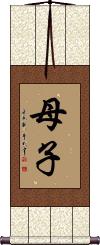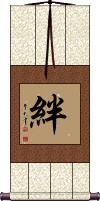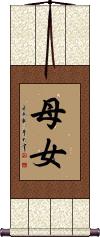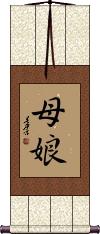Many custom options...
And formats...

Mother and Son in Chinese / Japanese...
Buy a Mother and Son calligraphy wall scroll here!
Personalize your custom “Mother and Son” project by clicking the button next to your favorite “Mother and Son” title below...
Mother and Son
母子 simply means “mother and son,” or the essence of the relationship and bond between mother and son.
母子 is really a single word that expresses this idea (showing how important or significant this bond is).
This is not the most common choice for a wall scroll, it is acceptable if you feel this term is important to you.
See Also: Mother and Daughter
Bond
This Kanji represents a bond, as in the bond between mother and daughter, father and son, family ties, or a family bond.
絆 is the kind of character that says, no matter what happens (difficult times), we have this bond that cannot be broken.
If you go to the Japanese dictionary, the definition is the bonds (between people), (emotional) ties, relationship, connection, link, tether, or fetters.
Read this before ordering...
This Kanji is best if your audience is Japanese. While this is also a Chinese character, it has a completely different meaning in Chinese (it means to hinder or stumble in Chinese).
it’s
a very rare character in Korean Hanja but does mean bond in Korean (used in Korean words for certain kinds of glue and sticking plaster).
Mother and Daughter
母女 means “mother and daughter” as a unit or as if mother and daughter are a whole together.
母女 is an unusual selection for a calligraphy wall scroll and can be read in many different ways. Your native Asian friends might wonder what you are trying to say. They might even read it as “a mother and daughter without a dad.”
This entry was added to our database for a customer's special request. It has the same meaning in Chinese Characters and Korean Hanja.
Mother and Daughter
This in-stock artwork might be what you are looking for, and ships right away...
Gallery Price: $60.00
Your Price: $36.88
Gallery Price: $60.00
Your Price: $36.88
Gallery Price: $60.00
Your Price: $36.88
Not the results for mother and son that you were looking for?
Below are some entries from our dictionary that may match your mother and son search...
| Characters If shown, 2nd row is Simp. Chinese |
Pronunciation Romanization |
Simple Dictionary Definition |
大權 大权 see styles |
dà quán da4 quan2 ta ch`üan ta chüan daigon |
power; authority The great potentiality; or the great power of Buddhas and bodhisattvas to transform themselves into others, by which e.g. Māyā becomes the mother of 1,000 Buddhas, Rāhula the son of 1,000 Buddhas, and all beings are within the potency of the dharmakāya. |
子母 see styles |
zǐ mǔ zi3 mu3 tzu mu |
mother and son; interest and capital; combination of a large object and a smaller one of the same type |
文殊 see styles |
wén shū wen2 shu1 wen shu monju もんじゅ |
Manjushri, the Bodhisattva of keen awareness (Buddhist term) Manjushri; Manjusri; Bodhisattva that represents transcendent wisdom; (p,s,f) Monju (文殊師利) Mañjuśrī 滿殊尸利 -later 曼殊室利. 文殊 is also used for Mañjunātha, Mañjudeva, Mañjughoṣa, Mañjuṣvara, et al. T., hjamdpal; J., Monju. Origin unknown; presumably, like most Buddhas and bodhisattvas, an idealization of a particular quality, in his case of Wisdom. Mañju is beautiful, Śrī; good fortune, virtue, majesty, lord, an epithet of a god. Six definitions are obtained from various scriptures: 妙首 (or 頭 ) wonderful or beautiful) head; 普首 universal head; 濡首 glossy head (probably a transliteration); 敬首 revered head; 妙德 wonderful virtue (or power); 妙吉祥 wonderfully auspicious; the last is a later translation in the 西域記. As guardian of wisdom 智慧 he is often placed on Śākyamuni's left, with 普顯 on the right as guardian of law 理, the latter holding the Law, the former the wisdom or exposition of it; formerly they held the reverse positions. He is often represented with five curls or waves to his hair indicating the 五智 q. v. or the five peaks; his hand holds the sword of wisdom and he sits on a lion emblematic of its stern majesty: but he has other forms. He is represented as a youth, i. e. eternal youth. His present abode is given as east of the universe, known as 淸涼山 clear and cool mountain, or a region 寶住 precious abode, or Abode of Treasures, or 寶氏 from which he derives one of his titles, 寶相如來. One of his dhāraṇīs prophesies China as his post-nirvāṇa realm. In past incarnations he is described as being the parent of many Buddhas and as having assisted the Buddha into existence; his title was 龍種上佛 the supreme Buddha of the nāgas, also 大身佛 or 神仙佛; now his title is 歡喜藏摩尼寶精佛 The spiritual Buddha who joyfully cares for the jewel: and his future title is to be 普現佛 Buddha universally revealed. In the 序品 Introductory Chapter of the Lotus Sutra he is also described as the ninth predecessor or Buddha-ancestor of Śākyamuni. He is looked on as the chief of the Bodhisattvas and represents them, as the chief disciple of the Buddha, or as his son 法王子. Hīnayāna counts Śāriputra as the wisest of the disciples, Mahāyāna gives Mañjuśrī the chief place, hence he is also styled 覺母 mother, or begetter of understanding. He is shown riding on either a lion or a peacock, or sitting on a white lotus; often he holds a book, emblem of wisdom, or a blue lotus; in certain rooms of a monastery he is shown as a monk; and he appears in military array as defender of the faith. His signs, magic words, and so on, are found in various sutras. His most famous centre in China is Wu-tai shan in Shansi. where he is the object of pilgrimages, especially of Mongols. The legends about him are many. He takes the place in Buddhism of Viśvakarman as Vulcan, or architect, of the universe. He is one of the eight Dhyāni-bodhisattvas, and sometimes has the image of Akṣobhya in his crown. He was mentioned in China as early as the fourth century and in the Lotus Sutra he frequently appears, especially as the converter of the daughter of the Dragon-king of the Ocean. He has five messengers 五使者 and eight youths 八童子 attending on him. His hall in the Garbhadhātu maṇḍala is the seventh, in which his group numbers twenty-five. His position is northeast. There are numerous sutras and other works with his name as title, e. g. 文殊師利問菩提經 Gayaśīrṣa sūtra, tr. by Kumārajīva 384-417: and its 論 or .Tīkā of Vasubandhu, tr. by Bodhiruci 535. see list in B. N. |
補羯娑 补羯娑 see styles |
bǔ jié suō bu3 jie2 suo1 pu chieh so fukasha |
paulkasa, an aboriginal, or the son 'of a śūdra father and of a kshatryā mother' (M.W.); intp. as low caste, scavenger, also an unbeliever (in the Buddhist doctrine of 因果 or retribution). |
補羯婆 see styles |
bǔ jié pó bu3 jie2 po2 pu chieh p`o pu chieh po |
[Note: 婆 should probably be 娑] paulkasa, an aboriginal, or the son 'of a śūdra father and of a kshatryā mother' (M.W.); intp. as low caste, scavenger, also an unbeliever (in the Buddhist doctrine of 因果 or retribution). |
七倶胝佛母尊 see styles |
qī jù zhī fó mǔ zūn qi1 ju4 zhi1 fo2 mu3 zun1 ch`i chü chih fo mu tsun chi chü chih fo mu tsun Shichikuchi butsumo son |
Saptakotibuddha-mātṛ. The fabulous mother of seven koṭīs of Buddhas; i.e. Marīci 摩利支; also 準提 Cundī, or Cundā; or 準提觀音 Cundī-Guanyin, q.v., who is represented as of whitish color, with eighteen hands and three eyes. |
The following table may be helpful for those studying Chinese or Japanese...
| Title | Characters | Romaji (Romanized Japanese) | Various forms of Romanized Chinese | |
| Mother and Son | 母子 | bo shi / boshi | mǔ zǐ / mu3 zi3 / mu zi / muzi | mu tzu / mutzu |
| Bond | 絆 绊 | kizuna | bàn / ban4 / ban | pan |
| Mother and Daughter | 母女 | mǔ nǚ / mu3 nv3 / mu nv / munv | mu nü / munü | |
| Mother and Daughter | 母娘 | haha musume hahamusume | ||
| In some entries above you will see that characters have different versions above and below a line. In these cases, the characters above the line are Traditional Chinese, while the ones below are Simplified Chinese. | ||||
Successful Chinese Character and Japanese Kanji calligraphy searches within the last few hours...












